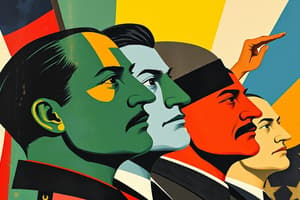Podcast
Questions and Answers
What is the defining characteristic of a totalitarian political system?
What is the defining characteristic of a totalitarian political system?
- Multiple parties competing for power
- A decentralized system with minimal government control
- A direct democracy where citizens make decisions
- A single, all-powerful party or leader (correct)
Which type of totalitarianism emphasizes the role of the state in controlling the economy and achieving social equality?
Which type of totalitarianism emphasizes the role of the state in controlling the economy and achieving social equality?
- Communist totalitarianism (correct)
- Fascist totalitarianism
- Theocratic totalitarianism
- Authoritarian totalitarianism
Which of the following is a key feature of totalitarianism?
Which of the following is a key feature of totalitarianism?
- Free and fair elections
- Decentralization of power and decision-making
- Protection of individual freedoms and rights
- State control of the economy and media (correct)
Which totalitarian leader was known for his rule in Nazi Germany?
Which totalitarian leader was known for his rule in Nazi Germany?
What is a common characteristic of totalitarian leaders?
What is a common characteristic of totalitarian leaders?
What is a key method used by totalitarian leaders to maintain power?
What is a key method used by totalitarian leaders to maintain power?
Flashcards are hidden until you start studying
Study Notes
Definition and Characteristics
- Totalitarianism is a political system in which the state holds total authority over all aspects of life, including the economy, education, and culture.
- It is characterized by a single, all-powerful party or leader that exercises total control over the population.
- Key features:
- Suppression of individual freedoms and rights
- State control of the economy and media
- Propaganda and manipulation of information
- Surveillance and repression of dissent
Types of Totalitarianism
- Communist totalitarianism (e.g. Soviet Union, China): emphasizes the role of the state in controlling the economy and achieving social equality.
- Fascist totalitarianism (e.g. Nazi Germany, Italy): emphasizes the importance of national identity and the subordination of individual rights to the state.
- Theocratic totalitarianism (e.g. Iran, Saudi Arabia): combines political and religious authority.
Key Figures and Regimes
- Adolf Hitler (Nazi Germany)
- Joseph Stalin (Soviet Union)
- Mao Zedong (China)
- Benito Mussolini (Italy)
- Kim Il-sung (North Korea)
Characteristics of Totalitarian Leaders
- Charismatic and authoritarian personality
- Use of propaganda and manipulation to maintain power
- Suppression of dissent and opposition
- Cult of personality (e.g. Stalin, Mao, Kim)
Criticisms and Consequences
- Violation of human rights and individual freedoms
- Economic inefficiency and stagnation
- Suppression of creativity and innovation
- Potential for widespread violence and genocide
Historical Context
- Emerged in the early 20th century as a response to the perceived failures of liberal democracy and the rise of communism
- Peaked during World War II and the Cold War
- Declined with the collapse of the Soviet Union and the end of the Cold War in the late 20th century
Studying That Suits You
Use AI to generate personalized quizzes and flashcards to suit your learning preferences.




